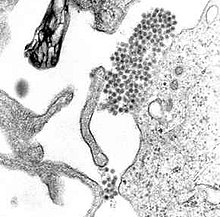骨痛热症病毒
外观
(重定向自登革病毒)
| 骨痛热症病毒 | |
|---|---|

| |
| 登革2型病毒的电子显微镜照片,病毒正在一个细胞裡繁殖。放大倍数是123,000倍(圖片来自美国疾病控制中心) | |
| 病毒分類 | |
| (未分级): | 病毒 Virus |
| 域: | 核糖病毒域 Riboviria |
| 界: | 正核糖病毒界 Orthornavirae |
| 门: | 黃色病毒門 Kitrinoviricota |
| 纲: | 黃病毒綱 Flasuviricetes |
| 目: | 黃熱病毒目 Amarillovirales |
| 科: | 黃病毒科 Flaviviridae |
| 属: | 黄病毒属 Flavivirus |
| 种: | 骨痛热症病毒 Dengue virus
|
登革热病毒(英語:Dengue virus)又名登革热病毒,是黃病毒科黃病毒屬的一种正義單鏈RNA病毒。这种病毒是登革热、登革溢血热和登革休克综合征的病原体。此类病毒的传播媒介是兩種黑斑蚊——埃及斑蚊和白线斑蚊。[1][2]
分类
[编辑]登革热病毒依其外壳抗原可以分成5种血清型[3][4],分别是:
- 登革病毒1型(DENV-1)
- 登革病毒2型(DENV-2)
- 登革病毒3型(DENV-3)
- 登革病毒4型(DENV-4)
- 登革病毒5型(DENV-5)
五种血清型均有机会引发严重病症[5],此外还有47个分型已被发现[6],还可以和茲卡病毒及基孔肯雅熱共同感染[7]。
参考文献
[编辑]- ^ Rodenhuis-Zybert IA, Wilschut J, Smit JM. Dengue virus life cycle: viral and host factors modulating infectivity. Cellular and Molecular Life Sciences. August 2010, 67 (16): 2773–86. PMID 20372965. doi:10.1007/s00018-010-0357-z.
- ^ WHO. Dengue Guidelines for Diagnosis, Treatment, Prevention and Control (PDF). World Health Organization. 2009 [2020-03-29]. ISBN 978-92-4-154787-1. (原始内容存档 (PDF)于2012-10-17).
- ^ Normile D. Tropical medicine. Surprising new dengue virus throws a spanner in disease control efforts. Science. October 2013, 342 (6157): 415. Bibcode:2013Sci...342..415N. PMID 24159024. doi:10.1126/science.342.6157.415.
- ^ Dwivedi, V. D., Tripathi, I. P., Tripathi, R. C., Bharadwaj, S., & Mishra, S. K. (2017). Genomics, proteomics and evolution of Dengue virus. Briefings in functional genomics.16(4): 217–227, https://doi.org/10.1093/bfgp/elw040 (页面存档备份,存于互联网档案馆)
- ^ A new understanding of Dengue virus. ScienceDaily. September 18, 2015 [May 7, 2016]. (原始内容存档于2020-11-06).
- ^ A Second Time Dengue Infection Can be Life-Threatening Says Research. NDTV (United Kingdom). September 18, 2015 [2016-05-07]. (原始内容存档于2020-03-29).
- ^ Vogels CB, Rückert C, Cavany SM, Perkins TA, Ebel GD, Grubaugh ND. Arbovirus coinfection and co-transmission: A neglected public health concern?. PLOS Biology. January 2019, 17 (1): e3000130. PMC 6358106
 . PMID 30668574. doi:10.1371/journal.pbio.3000130.
. PMID 30668574. doi:10.1371/journal.pbio.3000130.
| 这是一篇與病毒相關的小作品。您可以通过编辑或修订扩充其内容。 |
